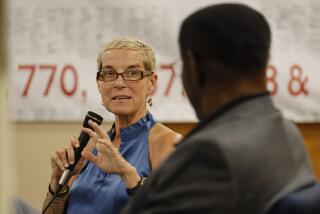I. W. Abel Dies; Led Steelworkers Union
- Share via
MALVERN, Ohio — I. W. Abel, the gruff-voiced son of a blacksmith who became the third president of the nation’s then third-largest union, the United Steelworkers of America, died at his home here Monday, one day short of his 79th birthday.
The union said Abel, who had recently returned to Ohio after living in Arizona, died of cancer.
“Abel was not only a lifelong and dedicated trade unionist who helped forge landmark improvements in the lot of working people, he was also a compassionate human being who strove to improve the total society in which we live,” said Lynn Williams, the union’s current international president, in a statement issued in Pittsburgh, Pa.
Abel led the USW through a period of labor peace, booming production and surging wages and benefits. His presidency was marked by coordinated bargaining with 12 leading steelmakers as union membership peaked at 1.4 million.
Experimental Accord Fails
A no-strike deal, called the Experimental Negotiating Agreement, was struck to end uneven production and buying that came with worries of steel strikes, but it fell apart in recent years as the steel industry came on hard times.
Union membership has fallen to about 650,000, largely because of shutdowns and cutbacks at steel mills and other factories, many of them hurt by foreign competition.
In a 1986 interview, Abel said he believed his greatest accomplishment as USW president was campaigning for passage of a federal law protecting employee pensions.
Born Iorwith Wilbur Abel, he joined the labor movement at age 22 after losing a 16-cent-an-hour job firing kilns in a brickyard during the Great Depression.
“I guess it was at that job more than any other that helped develop my social thinking,” Abel once said. “The Depression taught me that a strong labor movement was necessary to protect workers and give them a measure of dignity and security.”
Abel, descended from Welsh coal miners, had worked side by side with Mexican, Italian and Slavic immigrants in the Canton, Ohio, steel mills in the 1930s.
He joined the Steelworkers Organizing Committee in 1936, the year 10 of its members were killed in Chicago when police opened fire on a Memorial Day picnic and rally.
A Life magazine profile once referred to him as “the biggest union hell-raiser in Canton” during the 1930s who once led 42 wildcat strikes in a single year.
The United Steelworkers was founded in 1942, and Abel served as director of the union’s District 27 from 1942 to 1952, when he was elected international secretary-treasurer.
Abel, who followed Philip Murray and David J. McDonald when elected international president by a slim margin in 1965, was reelected in 1969 and 1973 and stepped down in 1977. He was the last of the original USW organizers to lead the organization.
Philosophy Reaffirmed
“I’m going to lead the good life now,” he joked after the union’s 1977 presidential election when Abel-backed Lloyd McBride defeated the insurgent Edward Sadlowski in an affirmation of the Abel philosophy.
As a member of the union’s top hierarchy for a quarter-century, Abel saw the USW’s ranks eventually swell to include women and college graduates.
For steelworkers, Abel gained what the White House described as the highest wages paid to industrial workers in the United States. Shortly after taking over the union in 1965, he negotiated wage increases averaging 17.9 cents per hour plus fringe benefits for each year of a new three-year contract. The major steel companies had offered only 11.5 cents an hour.
Abel was a member of the Kerner Commission, which investigated disorders in American cities in 1967, and served in the U.S. delegation to the United Nations.
In the Associated Press interview last year, Abel said attitudes about organized labor had changed for the worse--in part, because people forget the past.
Traces Change to Fear
“Some of it is fear. Some of it is concern with what’s happened, industry shutting down plants and laying off many people,” Abel said.
“Then you’ve got the younger element,” he added. “They think we’ve always had good wages because employers believed in paying good wages. They think they get benefits like we have and holidays, vacations, medical insurance and all that because employers want to give them that.”
Most of what workers receive today from employers represents a century or more of sometimes deadly struggle against big business, Abel said.
Abel’s first wife of 52 years died in 1982. He is survived by his second wife, Martha, two daughters and five grandchildren.
More to Read
Sign up for Essential California
The most important California stories and recommendations in your inbox every morning.
You may occasionally receive promotional content from the Los Angeles Times.










